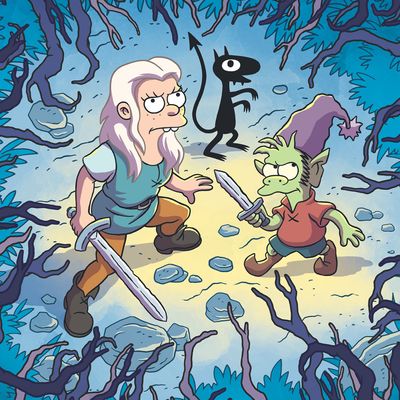
For the first 15 minutes of its first episode, Disenchantment seems like a promising fractured fairy tale dressed in the animation style of The Simpsons and Futurama. Created by Matt Groening, who famously gave birth to those aforementioned series, Disenchantment immediately introduces us to Bean (voiced by Broad City’s Abbi Jacobson), the princess of Dreamland who is far more interested in drinking heavily than performing her royal duties, and Elfo (Nat Faxon), who looks like one of the Happy Little Elves Lisa Simpson used to love, except that he’s not happy. “I wish I could go somewhere where people are miserable,” he says early in the first episode, a statement that foreshadows his escape from the cheerily draconian Elfwood and his arrival in Dreamland, where he befriends Bean and the demon, Luci (Eric André), who has supposedly cursed her.
Basically, Disenchantment, Groening’s first project for Netflix, sets itself up as a Disney movie turned upside down and tonally streaked with charcoal, or The Princess Bride with darker, more adult jokes. It takes place in a realm known for happily ever afters, but where everyone probably is or should be on antidepressants. That may not be a wildly inventive idea: Pop culture has put cockeyed twists on fantasy stories since The Adventures of Rocky and Bullwinkle gave us Fractured Fairy Tales, if not earlier. But it’s still a fun concept whose vaguely satirical bent seems right up the cobblestoned alley of Groening and his collaborators, several of whom — executive producers Bill Oakley and Josh Weinstein, as well as writers David X. Cohen, Patric M. Verrone and Eric Horsted — previously worked on The Simpsons and/or Futurama. But Disenchantment is never as much of a blast as it could be or seems to think it is.
The comedic sensibilities of Disenchantment are definitely Simpsonian/Futurama-ish. There are loads of Easter egg-y background jokes: Every shop and venue in Dreamland has been given a deliberately punny name, even the bleak local orphanage (Little Orphan Annex). The humor sometimes veers toward the crude, as it does in episode six when Bean, acting as an ambassador during a visit to the enemy-turned-ally kingdom of Dankmire, gets drunk, flashes a dinner table full of officials while hanging upside down from a chandelier, then pukes all over the place. Sarcasm and irony are constants. (“I like this,” says Bean while munching on a meal that might contain the meat of a recently roasted Elfo, who has an unrequited crush on Bean. “But only as a friend,” she adds.) At one point, Bean’s preselected potential husband even turns into an oinker who looks like the twin brother of Spider-Pig from The Simpsons Movie.
If these gags sound a bit too familiar, they feel even more recycled in the context of the series. On the cleverness and hilarity spectrum, Disenchantment is much closer to season 29 of The Simpsons than season four, which is an issue for a show that’s only just begun. There are some moments that do work, including a genuinely funny run in episode five when Bean, working briefly as an executioner, offers to share a final meal with a soon-to-be-offed criminal, but keeps trying to influence his selection. (“Oh, I had stew for lunch,” she complains when the dead man walking instantly says that’s what he craves.) But the jokes that fall flat far outweigh the ones that land. The fact that all ten episodes — seven of which were provided in advance by Netflix — can be watched one right after the other only serves to underline all the staleness.
The voice cast of the series is strong, although sometimes misused. Jacobson’s scratchy ruefulness is a perfect match for Bean’s mix of anti-establishment attitude and indifference, while Faxon gives Elfo a naïveté and sense of disappointment that suggests his character’s name should actually be FML Smurf. But John DiMaggio — the extremely gifted voice actor who played Bender on Futurama — doesn’t quite work as King Zog, the stubborn father of Bean. That may be less DiMaggio’s fault than a flaw in the writing, which doesn’t give Zog a lot of layers with which the actor can play. Zog’s defining characteristic, and this is stated more than once in the dialogue, is that he yells a lot. He sounds less like a king and more like an angry butcher from Jersey, which I suppose is the point: These royals ain’tcha regular royals! But Disenchanted never does more with the character or his dynamic with Bean than establish that both are atypical and dysfunctional.
Disenchanted never fully engages with the genre it’s riffing on, either. A series about an alcoholic princess with no desire to conform to social norms and an elf hungry to seek greater heights provides a natural opportunity to comment on gender expectations and the limited worldview that most fairy tales serve to impressionable children. But Disenchanted doesn’t seem interested in wrestling with tropes or, for that matter, anything too deep. It’s more focused on finding easy comedy in the pockets of the universe it’s invented, which, to the credit of Rough Draft, the animation studio that brings the show to life, has an impressive, cinematic quality that outshines previous Groening projects. It’s just a shame that it doesn’t match that ambition in other areas.
Netflix is famous for giving revered TV talents enormous creative latitude, and that can be a good thing. But in this case, it would have been nice if Groening & Co. had received more pushback on some of the their choices, as opposed to what appears to be a collective “As you wish.”


